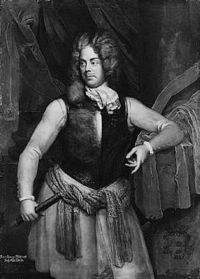
Nils Bielke
Encyclopedia

Born the eldest son of Baron Ture Nilsson Bielke, who died in 1648, Queen Christina granted the young boy the barony of Korpo
Korpo
Korpo is a former municipality of Finland. On 1 January 2009, it was consolidated with Houtskär, Iniö, Nagu and Pargas to form the new town of Väståboland.It is located in the province of Western Finland and is part of the Finland Proper region...
in the archipelago of Finland Proper
Finland Proper
Finland Proper or Southwest Finland , is a region in south-western Finland. It borders the regions of Satakunta, Tavastia Proper, Ahvenanmaa and Uusimaa.- Municipalities :...
in 1649. He married countess Eva Horn, one of the heiresses of the sonless field marshal Count Gustav Horn af Björneborg.
Nils Bielke entered the service of the Swedish Army and the Royal Court in the 1660s. He was appointed Lieutenant General
Lieutenant General
Lieutenant General is a military rank used in many countries. The rank traces its origins to the Middle Ages where the title of Lieutenant General was held by the second in command on the battlefield, who was normally subordinate to a Captain General....
in 1678, Governor-General
Governor-General
A Governor-General, is a vice-regal person of a monarch in an independent realm or a major colonial circonscription. Depending on the political arrangement of the territory, a Governor General can be a governor of high rank, or a principal governor ranking above "ordinary" governors.- Current uses...
of Swedish Estonia
Swedish Estonia
The Duchy of Estonia , also known as Swedish Estonia, was a dominion of the Swedish Empire from 1561 until 1721, when it was ceded to Russia in the Treaty of Nystad, following its capitulation in the Great Northern War. The dominion arose when the northern parts of present-day Estonia were united...
in 1687 and Swedish Pomerania
Swedish Pomerania
Swedish Pomerania was a Dominion under the Swedish Crown from 1630 to 1815, situated on what is now the Baltic coast of Germany and Poland. Following the Polish War and the Thirty Years' War, Sweden held extensive control over the lands on the southern Baltic coast, including Pomerania and parts...
(1687–98). He became Field Marshal
Field Marshal
Field Marshal is a military rank. Traditionally, it is the highest military rank in an army.-Etymology:The origin of the rank of field marshal dates to the early Middle Ages, originally meaning the keeper of the king's horses , from the time of the early Frankish kings.-Usage and hierarchical...
in 1690.
During the Scanian War
Scanian War
The Scanian War was a part of the Northern Wars involving the union of Denmark-Norway, Brandenburg and Sweden. It was fought mainly on Scanian soil, in the former Danish provinces along the border with Sweden and in Northern Germany...
(1675–1679), he made important contributions both as a troop organizer and as an officer on the field. He especially distinguished himself at the Battle of Lund
Battle of Lund
The Battle of Lund was fought on December 4, 1676 in an area north of the city of Lund in Scania in southern Sweden, between the invading Danish army and the army of Charles XI of Sweden. It was part of the Scanian War...
in 1676 as the commander of the Royal Cavalry Guard (Livregementet till häst).
He was Sweden's ambassador in France from 1679–1682 and 1684–1687, he took part in Emperor Leopold I
Leopold I, Holy Roman Emperor
| style="float:right;" | Leopold I was a Holy Roman Emperor, King of Hungary and King of Bohemia. A member of the Habsburg family, he was the second son of Emperor Ferdinand III and his first wife, Maria Anna of Spain. His maternal grandparents were Philip III of Spain and Margaret of Austria...
's Great Turkish War
Great Turkish War
The Great Turkish War refers to a series of conflicts between the Ottoman Empire and contemporary European powers, then joined into a Holy League, during the second half of the 17th century.-1667–1683:...
. He was created Reichsgraf in the Holy Roman Empire
Holy Roman Empire
The Holy Roman Empire was a realm that existed from 962 to 1806 in Central Europe.It was ruled by the Holy Roman Emperor. Its character changed during the Middle Ages and the Early Modern period, when the power of the emperor gradually weakened in favour of the princes...
. Charles XI of Sweden
Charles XI of Sweden
Charles XI also Carl, was King of Sweden from 1660 until his death, in a period in Swedish history known as the Swedish empire ....
later allowed him comital rank in Sweden.
Nils Bielke was dissatisfied with Charles XI's despotic policy towards the old aristocracy. As the governor of Swedish Pomerania
Swedish Pomerania
Swedish Pomerania was a Dominion under the Swedish Crown from 1630 to 1815, situated on what is now the Baltic coast of Germany and Poland. Following the Polish War and the Thirty Years' War, Sweden held extensive control over the lands on the southern Baltic coast, including Pomerania and parts...
it was only reluctantly that he took part in the reduction of property belonging to the nobility. In addition to this, he undertook private negotiations in order to push Sweden towards a pro-French policy against the wishes of the Swedish government.
As a result of this, he lost his position in 1698 and after a long legal process, he was sentenced to death in 1705. He was, however, pardoned and in 1715, he was redeemed.
External links
- Nils Bielke, Historiesajten

